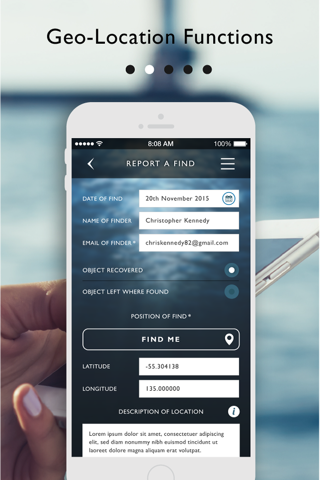
Marine Antiquities Scheme
Background
The Marine Antiquities Scheme (MAS) encourages and supports the voluntary recording of material of an archaeological nature found by members of the public in marine areas of England and Wales. It is relevant to activities not currently controlled by planning consents or subject to existing protocols for archaeological discoveries associated with development purposes.
The MAS app allows you to locate, record and submit information about any archaeological material discovered from the Mean Low Water Level out into English or Welsh waters (as far as the extent of the Exclusive Economic Zone which may be as much as 200 nautical miles from the shore). In return, the finder is able to discover more about their find through reports posted on the online finds database. Often the best way to protect an archaeological find ensuring its long term survival is to leave it undisturbed and this is encouraged as best archaeological practice. As a result, the MAS app allows you to record both objects and sites that still remain in their original position, or those that have been recovered.
Archaeological remains are often identified and sometimes recovered from submerged positions. Such discoveries are important for shedding light on past human endeavour and use of the landscape, sea and seabed. They also allow the underwater cultural heritage to be recorded and disseminated, and can help with protection on behalf of future generations. Many individuals who regularly use or visit marine environments have amassed considerable levels of awareness and knowledge of specific archaeological sites and areas.
Mobile devices are ideal tools for recording archaeological remains: a built-in camera allows quick and high quality images to be taken of an object or site, and the integral GPS facility allows an accurate position to be easily obtained.
As an everyday object, mobile devices are an excellent manner by which archaeological remains can be rapidly recorded, uploaded and subsequently accessed via the MAS website.
Archaeological remains may include:
• evidence of prehistoric activity when the sea levels were much lower including flint tools, animal bone, tusks or teeth, and organic remains in the form of peat and wood;
• remains of shipwrecks and any associated debris, potentially dating from the Mesolithic (8,500 – 4,000 BC) through to the modern period;
• aircraft crash sites together with any associated debris dating from the 20th century;
• ordnance potentially dating from the medieval period in the form of cannonballs or shot through to more modern objects; and
• many other objects that have found their way into a marine context by various means.
Privacy
Under the Data Protection Act 1998 no personal details will be passed on to any third party or Government Department unless the finder gives permission to do so. By uploading information through the MAS, the finder agrees to their contact details, as supplied, being automatically forwarded to the RoW. Records on the MAS database do not contain any personal information regarding the finder of the object or site.
About us
The MAS is commissioned, funded and overseen by The Crown Estate with the involvement of other key heritage and marine planning organisations including Historic England, Cadw and the Portable Antiquities Scheme (PAS).
The MAS is based on the highly successful PAS, a DCMS funded scheme coordinated by the British Museum that operates in a terrestrial context.
Wessex Archaeology implements the MAS and are also responsible for the overall maintenance of the website including the database.
The MAS app is administered by B60 via The Crown Estate.



